High Blood Pressure Medication And Short Term Memory Loss
17 Natural Remedies for High Blood Pressure (and One Cool Medication Trick)
Cutting down salt is just the beginning. Read on for tips on keeping your circulatory system healthy.
Take control of your blood pressure
The medicine cabinet isn't the only place to find the fix for high blood pressure. There are plenty of lifestyle tweaks you can make in the name of lowering blood pressure. Curious? Keep reading!
 Monkey Business Images/Shutterstock
Monkey Business Images/Shutterstock
Go for a walk
"Exercise strengthens your heart muscle so it can pump blood more efficiently," says preventive cardiologist Seth Martin, MD, associate professor of medicine at Johns Hopkins University School of Medicine in Baltimore. "And it can help relax your arteries. With your heart pumping with less force, your blood pressure is reduced."
No wonder the American Heart Association (AHA) recommends at least 150 minutes a week of heart-pumping physical activity. And you don't have to log a major sweat session to reap the rewards. A study published in 2019 in the journal Hypertension found that a 30-minute morning walk may be as effective as medication at lowering blood pressure for the rest of the day. If you're currently sedentary, try walking for 10 to 15 minutes and gradually work your way up to 30 minutes. Check out what else you should know about exercise for high blood pressure before getting started.
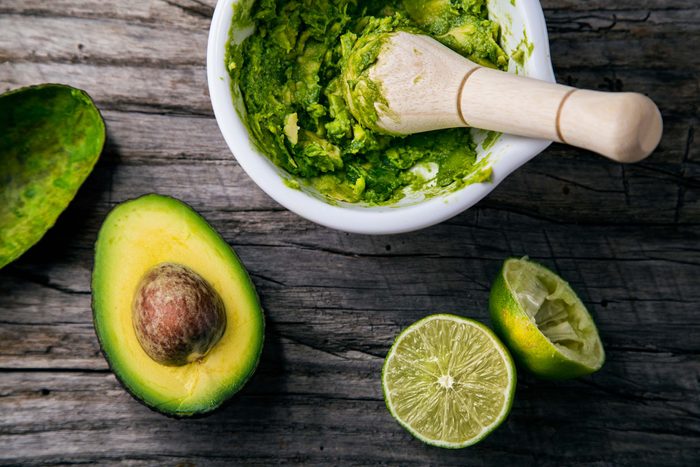 Istock/mphillips007
Istock/mphillips007
Load up on potassium
Eating foods rich in potassium—sometimes called the "un-salt"—can lower blood pressure, says cardiologist Harlan Krumholz, MD, professor of medicine at Yale School of Medicine and director of the Yale Center for Outcomes Research and Evaluation in New Haven, CT. That's because potassium lessens the effects of sodium. The more potassium you eat, the more sodium you lose through urine. Potassium also helps to ease tension in your blood vessel walls, which helps further lower blood pressure.
And yet fewer than 2 percent of Americans get the recommended 4.7 grams a day. How to meet the recommended daily amount? "Many foods—including avocados, beans, spinach, and raisins—are replete with potassium," says Dr. Krumholz. In fact, avocados pack in more potassium than any other vegetable or fruit, including bananas. Add some to your sandwich or salad for a nutritional boost.
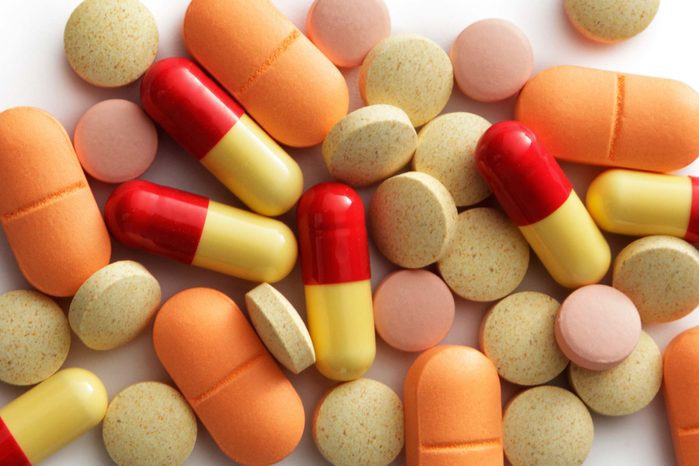 IStock/Floortje
IStock/Floortje
Schedule your medication
If you've started taking blood pressure-lowering medication but still aren't seeing reduced numbers, it could be that you're missing a dose here and there. In a study published in BMC Health Services Research exploring why people with chronic diseases don't take their prescribed meds, 62 percent said it was because they forgot.
To get into the habit of taking your meds as prescribed, try one of these tricks: Set a reminder on your cell phone or watch to go off at the same time every day; sync up your med-taking with an activity you do at the same time every day (making the morning coffee or brushing your teeth, for example); or place a reminder note someplace you can't miss it, like the bathroom mirror or refrigerator. (Find out if adding essential oils for high blood pressure can naturally boost your medication regimen.)
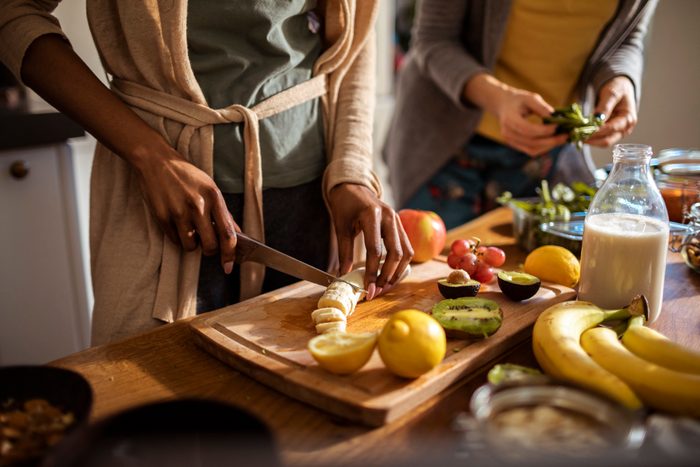 Marko Geber/Getty Images
Marko Geber/Getty Images
Eat a well-balanced diet
It's the single most important lifestyle change you can make if you're looking to lower your blood pressure, says Dr. Krumholz. Aim to eat a diet that's rich in fruits and vegetables, whole grains, low-fat dairy products, skinless poultry and fish, nuts and legumes, and non-tropical vegetable oils.
An easy way to satisfy every category on that list? "The DASH diet (Dietary Approaches to Stop Hypertension) has high-quality evidence to support the value of a diet rich in fruits, vegetables, and low-fat dairy foods in lowering blood pressure," says Dr. Krumholz. "The benefit for blood pressure can begin within two weeks."
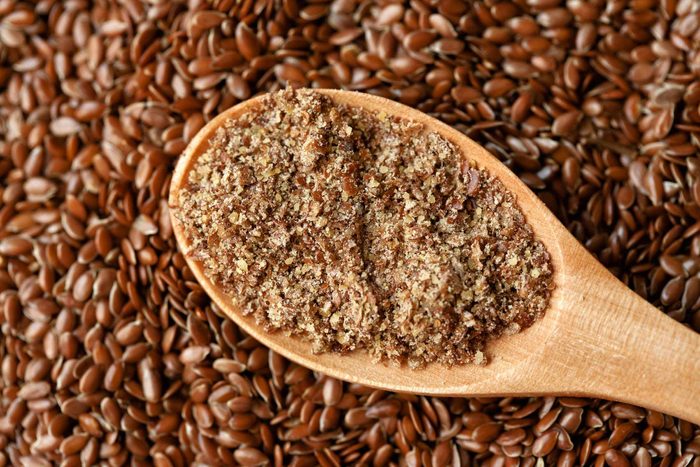 Istock/zeljkosantrac
Istock/zeljkosantrac
Include flaxseed
Consuming flaxseed may lower blood pressure, suggests a review of studies published in a 2015 issue ofThe Journal of Nutrition. Sprinkle on your oatmeal or yogurt at breakfast, and over soup or salad later in the day. And make a habit of it. Participants in the study saw the greatest benefit when they consumed the seeds for more than 12 weeks.
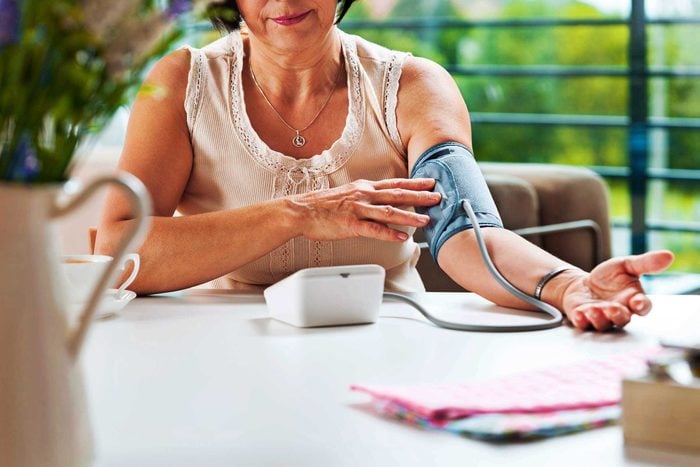 Istock/Izabela Habur
Istock/Izabela Habur
Invest in a home blood pressure kit
The AHA recommends using a home blood pressure monitor if you have high blood pressure. It'll help your doctor determine whether treatments are working. "The blood pressure in the office may not represent your blood pressure at all times," explains Dr. Krumholz. "The blood pressure that's measured outside the office can be very important in determining your risk of the consequences of high blood pressure."
Ask your health-care provider for a brand recommendation. "There are many inexpensive ones on the market," says Dr. Krumholz. Here's how to know when high blood pressure is an emergency.
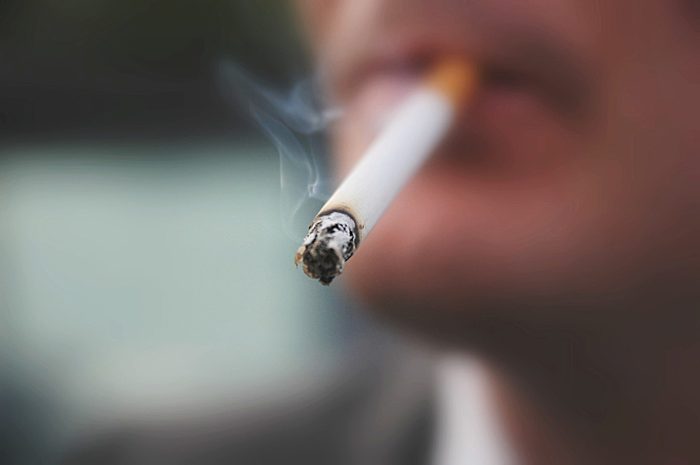 Erik Jonsson / EyeEm/Getty Images
Erik Jonsson / EyeEm/Getty Images
Quit smoking
Smoking is a proven risk factor for heart attack and stroke, but experts are still trying to get a handle on its connection to high blood pressure. This much is certain: "When you smoke, the nicotine can raise your blood pressure in the short-term," says Dr. Martin. "In the long-term, the hardening of the arteries can raise blood pressure."
Exposure to secondhand smoke also increases the risk for the buildup of fatty substances known as plaque inside the arteries—a process that high blood pressure is known to accelerate.
Here's some added incentive to quit smoking: The benefits start almost immediately.
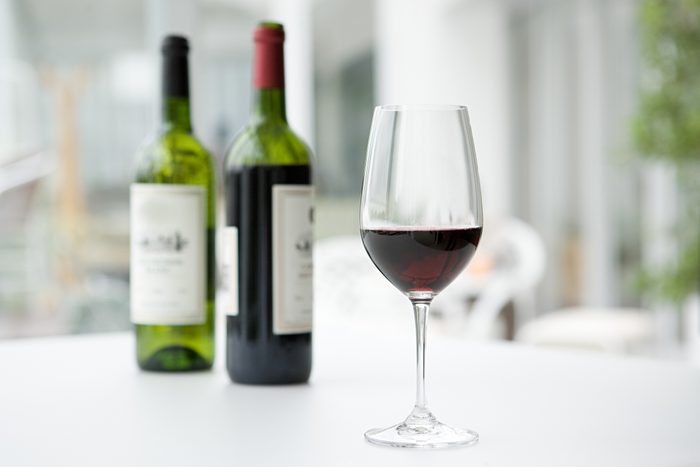 Image Source/Getty Images
Image Source/Getty Images
Limit alcohol
Drinking alcohol increases your odds of high blood pressure, especially if you drink excessively, according to a study published in 2018 in PLoS One.If you drink, the AHA suggests limiting your intake to no more than two drinks per day (for men) and one per day (for women). A drink is one 12-ounce beer, a 4-ounce glass of wine, 1.5 ounces of 80-proof spirits, or an ounce of 100-proof spirits.
"Excess alcohol may directly raise blood pressure, but there may also be indirect negative effects," says Dr. Martin. "Alcohol can be accompanied by an overall poor diet, leading to weight gain, which can increase blood pressure. If you already have high blood pressure and exceed the AHA's recommended limits on alcohol consumption, the risks may be even greater."
 Morsa Images/Getty Images
Morsa Images/Getty Images
Break up periods of uninterrupted sitting
Research links prolonged sitting with obesity and a cluster of conditions—increased blood pressure, high blood sugar, excess body fat around the waist, and abnormal cholesterol levels—that make up metabolic syndrome. One study, published in 2018 in the Journal of Occupational and Environmental Medicine,suggests that breaking up prolonged sitting with bouts of light physical activity may reduce blood pressure in people with hypertension.
Although experts "are still learning about what kind of patterns of activity or inactivity have consequences for health," says Dr. Krumholz, "you should punctuate the day with periods of activity." Every half hour, get up and stretch, walk, or do some other form of light activity. Another trick: Return e-mails, texts, and phone calls standing up.
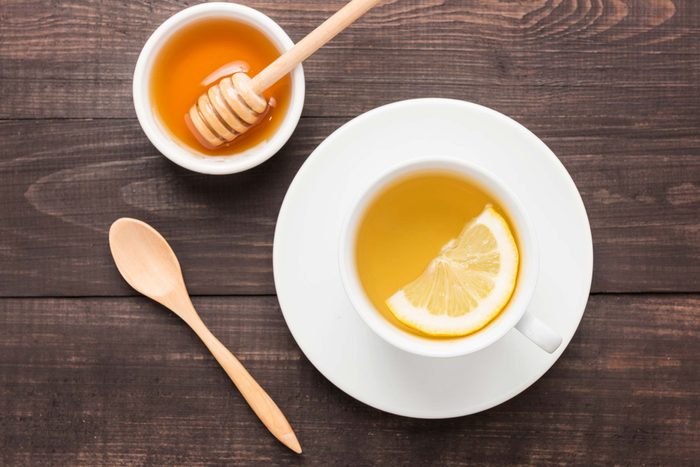 Istock/villagemoon
Istock/villagemoon
Drink tea
Plenty of research, including a study of more than 4,500 Chinese adults, published in 2017 in The Journal of Nutrition, Health & Aging, shows that drinking tea helps lower blood pressure. Wondering whether you should drink green tea or black tea for the blood pressure benefits? Either one will do the trick, according to a review of studies published in 2019 in Nutrients. The key is to drink tea every day.
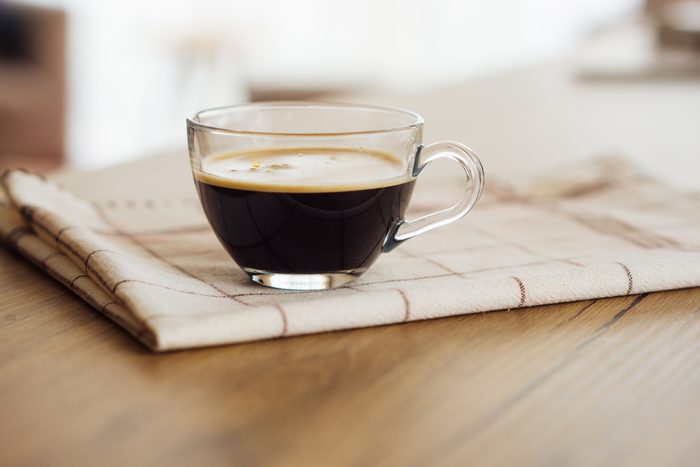 Burak Karademir/Getty Images
Burak Karademir/Getty Images
Limit coffee consumption
Coffee isn't off-limits for people with high blood pressure, but moderation is key, found a large review of studies published in 2017 in Expert Review of Cardiovascular Therapy.That regular cup of joe may increase blood pressure for up to three hours after you drink it. But if you're a regular coffee drinker, the effect is diminished. Don't miss everything you need to know about coffee and high blood pressure.
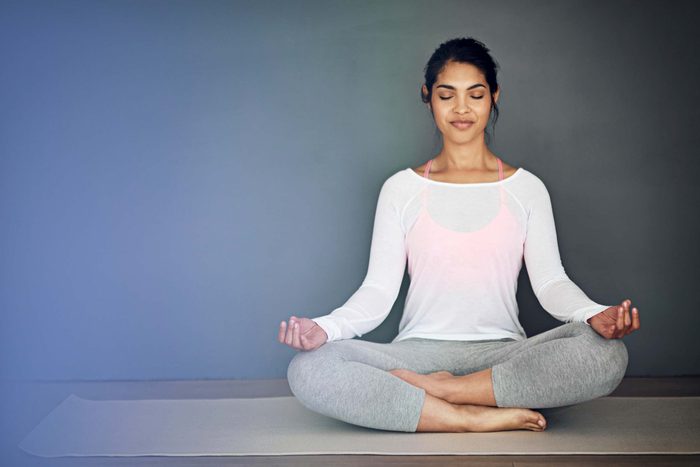 Istock/PeopleImages
Istock/PeopleImages
Practice meditation
Developing a regular meditation practice can help reduce blood pressure and stress, suggests a study published in 2019 in Journal of Human Hypertension. "Managing the stressful aspects of life is particularly important for people with high blood pressure," says Dr. Krumholz. "It's not about fully eliminating stress, but about developing the skills to mitigate its effects." Every day, carve out five minutes to sit quietly and repeat a simple mantra like "Breathe."
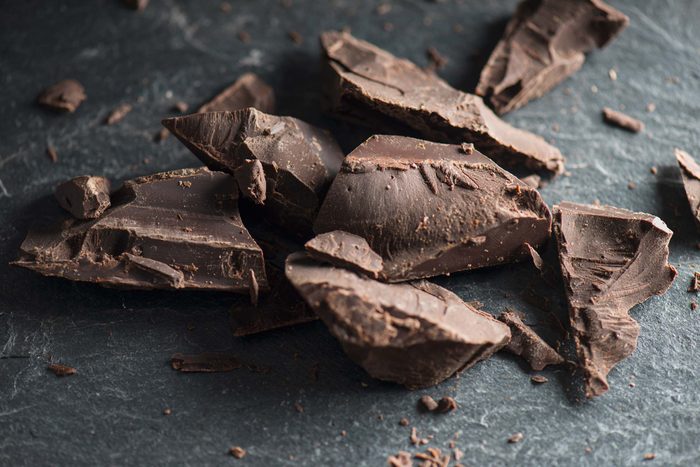 Istock/solidcolours
Istock/solidcolours
Enjoy dark chocolate
Milk chocolate is the most commonly consumed chocolate in America—but it's dark chocolate that offers health benefits. Most dark chocolate is high in flavonoids, particularly a subtype called flavanols which are associated with a lower risk of heart disease, according to the AHA.
Flavanols have been shown to support the production of nitric oxide in the inner cell lining of blood vessels that helps to relax the blood vessels and improve blood flow, thereby lowering blood pressure. But the science isn't conclusive, so limit yourself to a 1-ounce square, and choose 70 percent dark chocolate or higher. (Here are some other steps to take to lower your systolic blood pressure.)
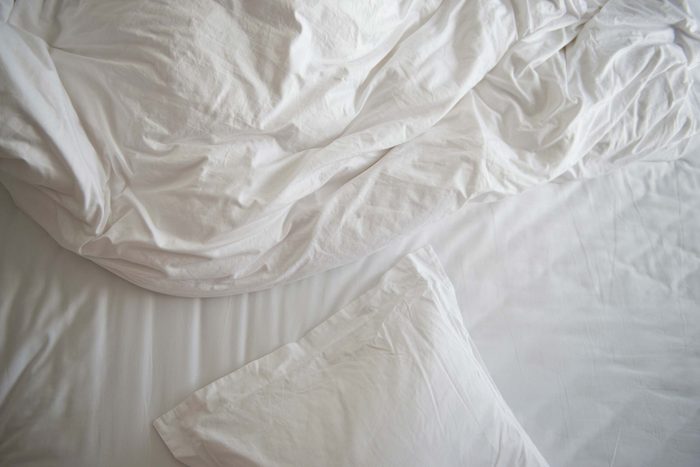 Istock/baona
Istock/baona
Assess your sleeping habits
Obstructive sleep apnea is a recognized cause of high blood pressure. In fact, about half of the people who have sleep apnea also have high blood pressure, according to a review of research published in the journalHypertension. The sleep disorder, in which breathing stops and starts dozens or hundreds of times a night, can be recognized by loud snoring or excessive tiredness during the day. Talk to a doctor if you have any of these nine signs of sleep apnea.
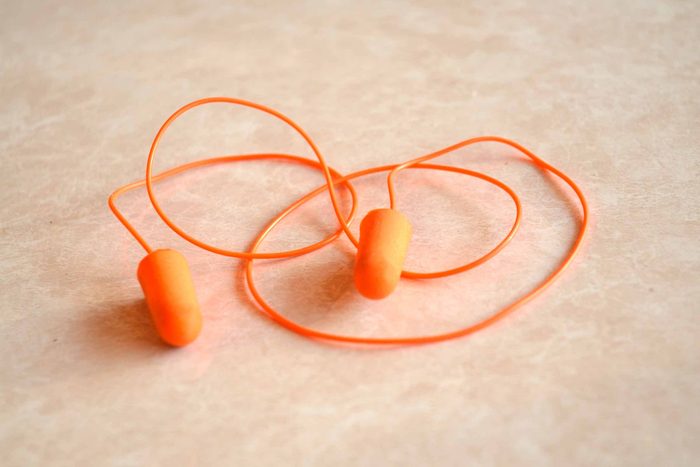 Istock/DJClaassen
Istock/DJClaassen
Wear earplugs when you sleep
A study published in 2019 in Psychosomatic Medicine shows a link between poor sleep habits and high blood pressure. One of the culprits? Noise! Research suggests that being exposed to noise—even while sleeping—can increase your blood pressure and heart rate. That's why the National Sleep Foundation recommends wearing earplugs at night, especially if you live in a noisy environment.
 Istock/Lepro
Istock/Lepro
Shake the salt habit
We all know about the link between hypertension and sodium: Slashing your sodium intake not only decreases blood pressure, but it can also lower your risk of cardiovascular disease, as countless studies—including a 2019 review of research published in Nutrients—have shown.
We need only 500 mg a day for the body to perform vital functions. But most Americans consume 3,400 mg every day, on average. To shake the salt habit, try swapping salt for spices, herbs, and flavorings like garlic, parsley, and allspice. And don't forget that sodium hides in unlikely places, like many breakfast cereal, salad dressings, soups, and tortillas. Every day, try to identify one source of sneaky salt and find a low-sodium replacement.
Sources
- Seth Martin, MD, preventive cardiologist and associate professor of medicine at Johns Hopkins University School of Medicine in Baltimore
- Hypertension, "Effect of Morning Exercise With or Without Breaks in Prolonged Sitting on Blood Pressure in Older Overweight/Obese Adults"
- American Heart Association: "How Potassium Can Help Control Blood Pressure."
- Harlan Krumholz, MD, cardiologist, professor of medicine at Yale School of Medicine, and director of the Yale Center for Outcomes Research and Evaluation in New Haven, CT
- BMC Health Services Research, "Unintentional non-adherence to chronic prescription medications: How unintentional is it really?"
- PLoS One, "Consumption of alcohol and blood pressure: Results of the ELSA-Brasil study"
- Journal of Occupational and Environmental Medicine, " Blood Pressure Response to Interrupting Workplace Sitting Time With Non-Exercise Physical Activity"
- The Journal of Nutrition, "Flaxseed consumption may reduce blood pressure: a systematic review and meta-analysis of controlled trials"
- Journal of Nutrition, Health & Aging , "Blood Pressure Is Associated with Tea Consumption"
- Expert Review of Cardiovascular Therapy, "The impact of coffee consumption on blood pressure, cardiovascular disease and diabetes mellitus"
- Nutrients, "Effects and Mechanisms of Tea Regulating Blood Pressure: Evidences and Promises"
- Journal of Human Hypertension, "Benefits of mindfulness meditation in reducing blood pressure and stress in patients with arterial hypertension"
- Circulation, "Pet Ownership and Cardiovascular Risk"
- Hypertension, "Obstructive Sleep Apnea and Hypertension."
- Psychosomatic Medicine, "Associations Between Objective Sleep and Ambulatory Blood Pressure in a Community Sample"
- Nutrients, " Sodium Intake and Hypertension"
- American Heart Association: "Managing High Blood Pressure Medications."
- Centers for Disease Control and Prevention: "Blood Pressure Control."
- American Heart Association: "How to Reduce Sodium."
- American Heart Association: "Monitoring Your Blood Pressure At Home."
![]() Medically reviewed by Oscar H. Cingolani, MD, on July 31, 2019
Medically reviewed by Oscar H. Cingolani, MD, on July 31, 2019
Originally Published: July 30, 2017
Sign Up For Our Newsletter
Get healthy-living advice delivered to your inbox!
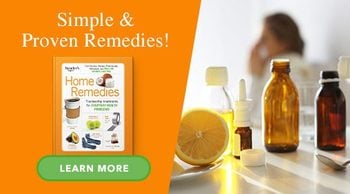
Source: https://www.thehealthy.com/heart-disease/natural-remedies-high-blood-pressure/
Posted by: majorsruebenayes.blogspot.com
Posting Komentar untuk "High Blood Pressure Medication And Short Term Memory Loss"